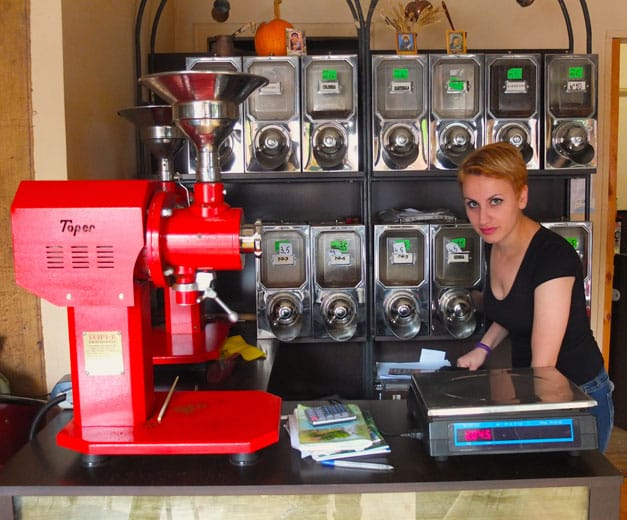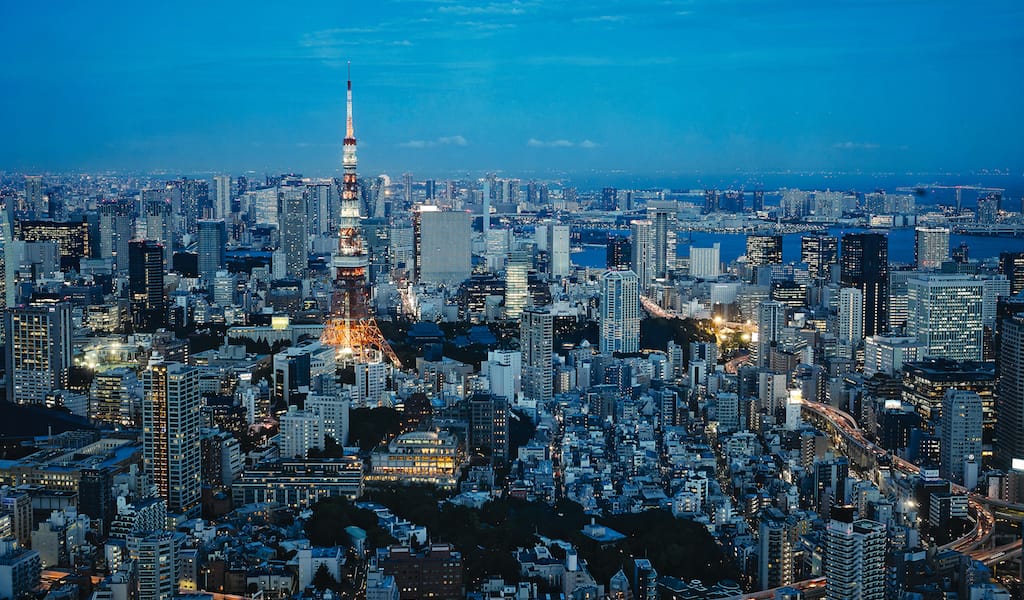With cafés popping up all over the country, from the arty boutique coffeehouses of Tbilisi to the Lavazza kiosks in villages like Zestafoni, it is easy to forget the humbler days of Georgia’s coffee culture, when an “Americano” was a chemically enhanced instant coffee powder in a stars-and-stripes-emblazoned packet added to a cup of hot water.
Before the proliferation of espresso machines, a real mug of joe meant a little porcelain cup of Turkuli – “Turkish” coffee – cooked cowboy-style by adding a heaping spoonful of ground coffee (and several spoons of sugar) to cold water and heating it in a plastic electric kettle or little copper pot on the stove. In Georgian homes, this is still the most widespread method for brewing coffee.
Like most local connoisseurs, we used to buy our coffee from our favorite bean dealer, which for us was an Armenian woman who rented a space in a nearby secondhand clothes shop and sold beans in plastic buckets labeled with such dubious monikers as Colombo, Nescafé and Pele. Knowing we liked our coffee potent but not too biting, she offered a blend of “Arabica” and “Mambo” beans, which suited us just fine.
Whenever we wanted to go the extra mile for good coffee, however, we would go to the main bazaar, next to Tbilisi’s central railway station, where another favorite dealer offered her special blend from a selection of over a dozen beans. For years, we were quite satisfied coffee junkies, meticulously brewing our Turkuli every morning, never imagining that life could get better. And then we met Ruben Avetisian, Georgia’s coffee guru.

It was late October 2010 when the 64-year-old Yerevan native cleaned out a little storefront on Perovskaya/Akhvlediani street and equipped it with a coffee-roasting machine. Soon the little strip of Irish-style pubs and Asian massage parlors was wafting in the seductive scent of roasting arabica and robusta beans, emanating from Le Cafe Du Monde. Our days of Mambo beans were part of the past.
“Oh, the beans from the bazaar are a catastrophe!” Avetisian shrieked, still drenched in sweat after a bout of roasting an hour earlier on this hot June afternoon. “Where are they roasted? I don’t know, but I think they are Indonesian beans. Cheap.”
Indonesian beans are an abomination to Avetisian. He says they smell like fish and are too wet. “There are only African beans and South American beans,” he said, switching to a heavily accented English, although he concedes that Indian Baba Budan and Nepalese beans are excellent too.
An Orientalist by profession who worked with the Armenian diaspora during Soviet times, Avetisian found himself without a job when the USSR disappeared, but he was “saved” by Valerie Gortsunian, a former associate whose family members were coffee magnates in France. She took him under her wing, teaching him the ins and outs of coffee until he decided to strike out on his own in Tbilisi, a venture that proved to be quite challenging at first.
“Georgians don’t know how to drink coffee!” he lamented. Yet his diligence and dedication to coffee are slowly paying off. He says more clients are realizing the difference between his personally hand-roasted organic beans and the mass-produced Lavazza, which most local restaurants and cafés buy. “I don’t roast quickly, like most Europeans,” he says. “I go slowly because I love the taste of the bean, not of the roast.”
Avetisian does not like selling decaffeinated coffee and prefers to offer his Number 10 blend, which he says is “light and delicate” and better to drink than chemically processed beans. For drinkers who want a kick, he recommends his espresso mix of 20 percent robusta and 80 percent arabica, or straight Ethiopia beans. But for flavor, he offers his own blends, like “Pirosmani,” named after Tbilisi’s favorite painter, for strong coffee lovers, and “Parajanov,” named after the famed Tbilisi Armenian director and artist. His personal favorite is Number 5, which he insists is a perfect balance of strength and flavor.
Recently, Avetisian slightly burned five kilos of beans, which he could have sold, but he threw it away instead. “Roasting is an art. You have to have pride in this,” he said. “It’s better to lose five kilos of burnt beans than to lose your clients.”
Editor’s note: We are sorry to report that Le Café du Monde is closed.
 May 3, 2019 CB Book Club
May 3, 2019 CB Book Club
Chef, food writer, and MasterChef champion Tim Anderson shares his love of Tokyo and […] Posted in Tokyo September 26, 2017 CB on the Road
September 26, 2017 CB on the Road
Update: Antakya Köfte is sadly no longer open.
Turkey’s charming southern city of […] Posted in Istanbul February 5, 2021 Taberna Noroeste
February 5, 2021 Taberna Noroeste
Born right before the Covid-19 storm, Taberna Noroeste opened its doors in February […] Posted in Barcelona
Published on June 12, 2015
Related stories
May 3, 2019
Tokyo | By Culinary Backstreets
TokyoChef, food writer, and MasterChef champion Tim Anderson shares his love of Tokyo and Japanese food culture in his new book, Tokyo Stories: A Japanese Cookbook (Hardie Grant, 2019). After moving to London, Anderson, who is originally from Wisconsin, won MasterChef in 2011, a title that catapulted him into a position as one of the…
September 26, 2017
IstanbulUpdate: Antakya Köfte is sadly no longer open. Turkey’s charming southern city of Antakya lies equidistant to the Mediterranean coast and the Syrian border, in the province of Hatay. The area is famed for its unique, spice-laden cuisine, though it is perhaps overshadowed by that of its neighbors to the east and west: Adana and…
February 5, 2021
BarcelonaBorn right before the Covid-19 storm, Taberna Noroeste opened its doors in February 2020, mere weeks before the pandemic hit Spain and strict confinement measures forced them to close. It was a turn of events that spelled disaster for many established restaurants and food businesses, let alone one that was brand new. Yet this project…


















































































